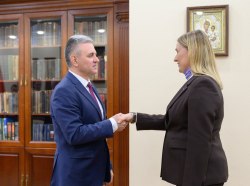Tiraspol, 4 December. /Novosti Pridnestrovya/. An effective dialogue between Moldova and Pridnestrovie requires a mechanism to guarantee that the parties would honour their commitments, foreign minister Vitaly Ignatyev said during a meeting of the Supreme Council committee on foreign policy and international relations.
As the diplomat explained, Moldovan representatives argue that the guarantee of the implementation of the agreements is the very fact of their conclusion. However, practice has shown that Kishinev refused to comply with the commitments it made on dozens of occasions without actually dissolving the agreements.
"The experience suggests that, regardless of who have signed documents, be it the presidents of the respected guarantor states — Ukraine and Russia, whether those documents have been deposited with the OSCE or other international organisations, Kishinev refuses to implement these agreements and, in fact, and bears no responsibility, and we don't see any active work by international partners. Therefore, we believe that the basic and most important element of our dialogue should be a guarantee mechanism," said Ignatyev.
The minister recalled that the need for such a mechanism was enshrined in the Berlin Protocol, which was adopted at a "Permanent Conference..." meeting on 2-3 June 2016. It was the representatives of the PMR and Russia who had proposed to sign the relative protocol decision back then.
The document which was signed in Vienna this autumn contains the obligation of the parties to arrive at a concrete result that would ensure the implementation of the agreements in 2018.
Pridnestrovie has groundwork for such a mechanism. As ex-foreign minister Vladimir Yastrebchak told Novosti Pridnestrovya, in 2009 Pridnestrovie submitted a draft agreement on guarantees which received "a fairly high assessment" on the part of negotiation participants.
But back then Moldova and Pridnestrovie failed to reach an agreement on that issue. Nevertheless, the principles set out in the 2009 document are still relevant today, the ex-minister notes.
"First, there is a need for a system of mutual guarantees between the parties, including time-bound implementation of the agreements into domestic law. It is also very important to have a system of external guarantees provided by our respected guarantor states — Russia and Ukraine," added Yastrebchak.
According to him, in order for the mechanism to function efficiently, the guarantor states should have a legal possibility to use various response mechanisms, including unplanned consultations, negotiations and other measures in the event one of the parties violates its obligations.
However, according to Yastrebchak, it is more important for the functionality of the mechanism to adopt a provision that would outline that Russia and Ukraine are the guarantors of the agreement which will be implemented even if Kishinev decides to revise it unilaterally.
In this case, Pridnestrovie would be protected from new restrictions, including in the area of freight transport and motor transport, the expert explained.








